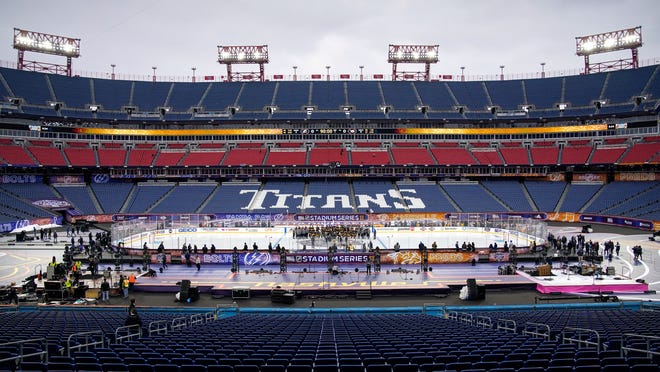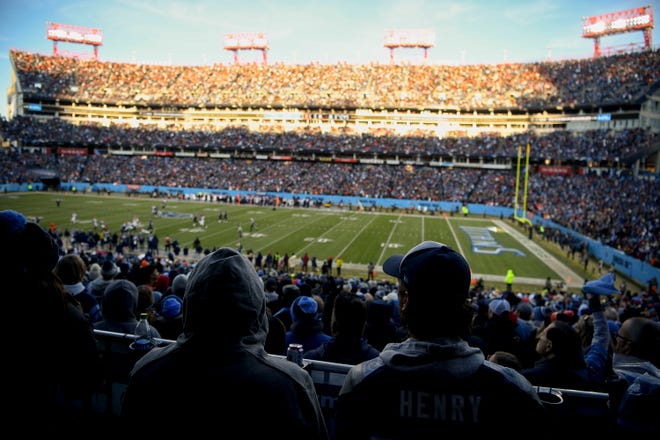Funding stadiums with taxpayer dollars simply cannot justified or fair to the ordinary tax payer, many of whom will never attend a game or event.
Daniel J. Smith
Guest Columnist
Daniel J. Smith is the director of the Political Economy Research Institute at Middle Tennessee State University.

Given the higher-than-expected renovation costs of Nissan Stadium, Nashville policymakers are now considering investing potentially a billion or more of taxpayer dollars into a new home for the Titans. The evidence shows that subsidizing a new stadium would be a boondoggle for the Music City.
Stadium subsidies are frequently justified on the grounds that they will have an impact on game day that boosts local employment and economic growth. Stadium supporters in Nashville hope that a new stadium will also attract mega-events such as concerts and even a future Super Bowl.
While economists are often criticized for having conflicting opinions, they do reach an overwhelming consensus on sports stadiums. Economists have sliced and diced the data every which way, and the results are crystal clear: Claims about the economic impact of stadiums consistently turn out to be empty promises based on misleading assumptions and exaggerations.
Hear more Tennessee Voices: Get the weekly opinion newsletter for insightful and thought provoking columns.
In a survey of the research done by academic economists, Dennis Coates and Brad Humphreys conclude, “we find near unanimity in the conclusion that stadiums, arenas and sports franchises have no consistent, positive impact on jobs, income, and tax revenues.”

The result makes sense considering people have set budgets for entertainment. If residents or tourists go to a Titans game, it means they are spending less on other entertainment options in the city.
Policymakers often also fail to recognize the negative effects on residents, who may opt to avoid game-day traffic rather than go out shopping and eating. However, the most important consideration is the economic activity, or alternative public project, that is lost when taxpayers find their wallets a little thinner.
Even if the city manages to keep its subsidy to $1 billion, that amounts to around $1,500 per resident.
New stadium will not boost economic growth

The evidence shows that even hosting additional mega-events, including the Super Bowl, does not boost economic growth. Super Bowl hosts can expect to raise five to ten million dollars in tax revenue, but that is hardly enough to justify the expense of a new stadium even if Nashville were guaranteed a chance to host it.
Hear from Tennessee's Black Voices:Get the weekly newsletter for powerful and critical thinking columns.
It doesn’t take an economist to see that undertaking a billion-dollar gamble in the hopes of hosting an event generating a few million dollars in tax revenue is a losing bet. Especially since hosting a Super Bowl would likely require millions of dollars of additional infrastructure and security investments.
Subsidizing stadiums is clearly a raw deal for cities, but it would be downright financially irresponsible for Nashville. The Music City’s out-of-control debt and underfunded pension liabilities already makes it one of the most fiscally stressed cities in the nation.
It is also one of the NFL franchises with the lowest populations, meaning the costs of the stadium would be concentrated on a much smaller tax base than other franchises.
Funding stadiums with taxpayer dollars simply cannot be justified by economic criteria. Nor does it seem fair to force ordinary taxpayers, many of whom will never attend a game or event, to finance it.
The primary beneficiaries— including the franchise owners, sports stars and suite owners— certainly have the means to pay their own bill. Nashville leaders should take a note from this year’s winner and host of the Super Bowl; the SoFi stadium that the Los Angeles Rams played in was entirely privately financed.
King Henry certainly deserves a fitting palace to showcase his amazing talent, hopefully in a Super Bowl hosted in Nashville, but it shouldn’t be on the taxpayers dime.

Daniel J. Smith is the director of the Political Economy Research Institute at Middle Tennessee State University and professor of economics at the Jones College of Business. Twitter: @smithdanj1
No comments:
Post a Comment